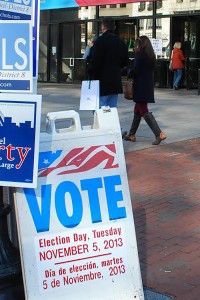
In an effort to identify the challenges Bostonians face regarding voting rights and election administration, the National Commission of Voting Rights held a hearing on Monday with a panel of specialists and testimony from residents voicing their experiences in voting at precincts in Massachusetts.
The NCVR, organized by the Lawyers’ Committee for Civil Rights Under Law, is conducting hearings like Monday’s, which was held at Suffolk University Law School, in 25 locations across the country in order to recognize what changes need to be made to ensure voting equality.
John Dunne, panelist and former assistant attorney general for civil rights, said one problem is that people who are eligible to vote fail to register because the registration process is not easily available.
“The big problem today is that those who are eligible to register don’t register because of certain barriers, like not making it open and accessible for people to register,” he said during the hearing. “There’s got to be more of a positive program to reach out to people and encourage people to become a part of the electoral process.”
At the end of the hearings, the NCVR will publish two national reports: one on voting discrimination issues in states across the country, and one on election administration, said Meredith Horton, organizer of the committee. Both of the reports will be available for policy makers, advocates and voters to help educate the public and support legislative reform.
Dunne said the reports are important because they will bring to light the discriminatory practices that take place at polling locations that affect minority groups.
“Our goal is to show that there are very real, serious, deeply imbedded discriminatory practices engaged in, which interfere with the rights of minorities and other protected groups from voting,” he said.
Elainy Mata, a sophomore at Suffolk University who served as a poll worker during the 2012 presidential election and this fall’s mayoral primary, spoke about some of the discriminatory practices she saw at her polling location in Roxbury where she worked as a Spanish interpreter.
“There were not just Spanish speakers coming out to vote, there were Cape Verdean speakers and Chinese speakers and I couldn’t help them,” she said at the hearing. “The lack of translators baffled me. It didn’t make sense that they couldn’t have help.”
Chris Robarge, 32, of Worcester, a member of the American Civil Liberties Union of Massachusetts, said certain abuses stem from the role of poll observer, a person whose part is to help voters navigate through precincts and the voting process.
“We’ve had a lot of issues,” he said. “What we found was we had folks who were increasingly using the role of pole observer to create an intimidating and hostile environment in some of our polling places.”
Robarge recalled one specific incident where the votes of Hispanic voters were removed from a pile of absentee ballots by a poll observer.
“We found in many cases that observers were using this avenue to challenge voters recklessly,” he said. “They would challenge people who were speaking Spanish or non-English languages. We had a situation in Charlton in 2012 where a poll observer went through a stack of absentee ballots and they pulled out all of the ballots of people with Hispanic last names.”
Jonathan Simon, a representative from the Election Defense Alliance, said it is important to pay serious attention to the way votes are counted because without that, discussing access, qualification and voter identification can be rendered useless.
“We want to have observable vote counting,” he said. “For some that means hand counted paper ballots, for others it’s a robust and well administered audit process, which is what I hope we are on the way to as part of the new legislation here in Massachusetts, because until now we’ve had nothing no audits, no spot checks, zero.”
All of these accounts and testimonies on issues facing the voting system will be recorded and used to push for reform, said Tyler Crosby, an organizer of the committee.
“These hearings will result in a document that catalogs all of the current issues all over the country, which will then be brought together in a report that will be given to the public and to legislators,” he said. “Hopefully it will serve as a backbone for legislative reform efforts.”


















































































































